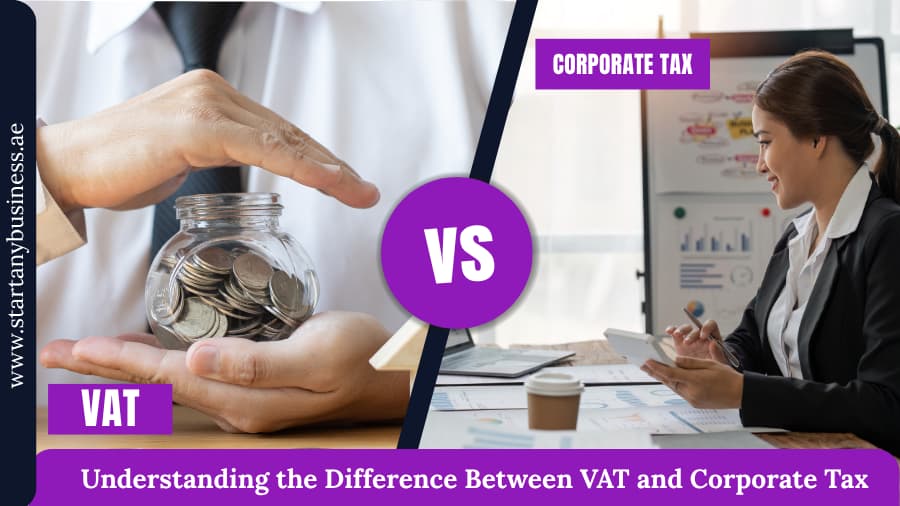Businesses of all sizes may find it hard to handle the complicated world of taxes. VAT and corporate tax are two of the most crucial ideas that any entrepreneur needs to comprehend, particularly in the context of the United Arab Emirates. Although the bottom line of your business is impacted by both taxes, they have different functions and are governed by different laws. Here, we are going to discuss the fundamental distinctions between corporate tax and VAT, as well as why hiring business consultants in Dubai and VAT consultants in the United Arab Emirates can be essential to maintaining compliance and minimizing your tax liabilities.
What Is VAT (Value Added Tax)?
Value Added Tax (VAT) is an indirect tax that is applied to the consumption of goods and services at every point in the supply chain. VAT, which was first implemented in the United Arab Emirates on January 1, 2018, at a standard rate of 5%, is applicable to the majority of transactions, including both domestic and import purchases. The basic idea behind VAT is that each company in the supply chain levies taxes based on the value they contribute to a good or service.

How VAT Works
1. Point of Sale Collection – A business adds VAT to the selling price when it sells goods or services. For instance, the final price to the customer is AED 105 (including 5% VAT) if the product’s pre-tax price is AED 100.
2. Input Tax Credit Mechanism – Companies can deduct the input tax (VAT) they paid on purchases from the output tax (VAT) they collected from clients. Let’s say a service provider spends AED 1,000 plus AED 50 (5% VAT) on software. They can avoid double taxation by deducting the AED 50 they paid for the software when they charge clients VAT for their services.
3. Registration Threshold – Companies are mandated to register for VAT if their yearly taxable supplies and imports surpass AED 375,000. Voluntary registration is an option for those whose annual supplies fall between AED 187,500 and AED 375,000.
VAT Compliance
1. Monthly and Quarterly Returns – The Federal Tax Authority (FTA) portal is where registered businesses are required to submit their periodic VAT returns. The business’s turnover determines the frequency (monthly or quarterly).
2. Record-keeping – For a minimum of five years, businesses are required to keep thorough records of all sales, purchases, imports, and VAT invoices.
3. Exempt and Zero-Rated Supplies – Some products and services, like medical care, education, and international travel, are exempt from VAT. In contrast, residential real estate rentals and financial services are typically exempt from VAT. Correctly identifying these categories is necessary to prevent fines.
Many companies hire VAT Consultants UAE to help them with registration, invoicing, filing returns, and general compliance because of the complexities of UAE VAT laws. These professionals assist in avoiding expensive errors like incorrectly classifying supplies or neglecting to submit input tax credit claims.
What Is Corporate Tax?
A corporation’s taxable profits are subject to a direct tax known as corporate tax (CT). Although fees, customs duties, and other indirect taxes were used in the UAE in the past instead of a federal corporate tax, recent economic reforms have brought in a federal corporate tax system that will go into effect on June 1, 2023. This action diversifies government revenue streams and brings the UAE into line with international best practices.

Key Features of Corporate Tax in the UAE
1. Standard Rate – For taxable profits over AED 375,000, the standard corporate tax rate is set at 9%. To assist startups and small businesses, profits up to AED 375,000 are eligible for a 0% rate.
2. Exemptions – Some organizations and sources of income are exempt, such as businesses that extract natural resources (which are subject to taxes at the Emirate level).
3. Regulatory Compliant – Qualifying Free Zone Persons (QFPs), so long as they don’t do business with the UAE mainland. Qualifying charitable organizations and public benefit entities.
4. Calculation of Taxable Profits – Companies are required to use International Financial Reporting Standards (IFRS) when preparing their financial statements. Accounting profits are used to calculate corporate tax after being modified for tax-exempt income, non-deductible costs, and other statutory adjustments.
Compliance Requirements
1. Registration – The Federal Tax Authority for Corporate Tax requires registration from all businesses having a legitimate presence in the United Arab Emirates, including those located in the Mainland and numerous Free Zones.
2. Financial Reporting – Within nine months of the conclusion of their fiscal year, businesses are required to file an annual corporate tax return and maintain audited financial statements.
3. Transfer Pricing Documentation – It is necessary to follow the Arm’s Length Principle when conducting related-party transactions. Businesses that make more than a certain amount of money are required to keep thorough records of transfer pricing and, if necessary, submit a master file and a local file.
Businesses have resorted to business consultants in Dubai like Start Any Business (SAB), especially those with tax advisory experience, in light of the new federal corporate tax regime in order to comprehend the ramifications, compute deductions, and put in place suitable accounting practices. These consultants also offer tax-efficient merger, acquisition, and expansion structuring advice.
Impact on Businesses
1. Cash Flow Considerations
- VAT – Businesses need to carefully manage cash flows because VAT is charged at every stage of a transaction. Although input tax credits are beneficial, postponing refund claims may result in short-term liquidity problems.
- Corporate Tax – After profits are determined, tax obligations are determined. In financial planning, corporate tax becomes a predictable expense if a business is consistently profitable.
2. Pricing Strategies
- VAT – Without reducing margins, businesses must include VAT in their pricing models. To adhere to regulations, transparent pricing shows the pre-tax price and the VAT component separately.
- Corporate Tax – Decisions about dividend distributions versus profit retention may be influenced by the effective corporate tax rate. To reduce their taxable income, many companies employ tax-efficient reinvestment techniques.
3. Compliance Burden
- VAT – Dedicated accounting resources are required for timely return filing, record-keeping, and regular invoicing. Penalties, late payment fines, and FTA audits may result from mistakes.
- Corporate Tax – Strong accounting and legal teams are required to calculate taxable profits under IFRS, ensure transfer pricing compliance, and maintain audited financial statements. The consequences of noncompliance can be serious, including fines and reputational damage.
How VAT Consultants UAE Can Help
Considering the intricacies of VAT, hiring knowledgeable VAT consultants UAE can have several advantages –
1. Assistance with Registration and Deregistration – When turnover falls below thresholds, consultants assist with eligibility determination, registration form preparation and submission, and voluntary deregistration guidance.
2. Invoicing and Documentation – They create VAT-compliant invoice templates, offer guidance on electronic invoicing options, and put in place record-keeping procedures that meet FTA audit standards.
3. VAT Return Preparation – Consultants compute net VAT payable or refundable by combining sales and purchase data, accurately completing VAT return forms, and submitting them on time.
4. Input Tax Optimization – VAT experts examine purchase transactions to make sure that the most input tax credits are recovered, especially for imports, cross-border transactions, and zero-rated supplies.
5. Training and Awareness – To help finance and procurement teams comprehend their roles and responsibilities, firms can receive tailored training sessions on VAT regulations.
Businesses reduce risk, stay out of trouble, and make sure they are in a strong position for any FTA audits by using VAT Consultants UAE.
Conclusion
Any company doing business in the United Arab Emirates must comprehend the distinction between corporate tax and value-added tax. Both taxes impose a distinct set of financial considerations and compliance requirements; corporate tax targets net profits, while value-added tax (VAT) concentrates on the consumption of goods and services. It makes sense to work with knowledgeable VAT Consultants UAE who can handle registration, invoicing, and return filing in order to handle this complex tax environment. In addition, working with knowledgeable business consultants in Dubai, such as Start Any Business (SAB), guarantees that your corporate tax responsibilities are fulfilled effectively while utilizing all available deductions, exemptions, and local incentives.
Businesses can avoid expensive fines and set themselves up for long-term success by combining professional consulting services for both corporate tax and VAT. Investing in expert advice is a wise move that will pay off in the long run, regardless of whether you’re a startup in Dubai trying to build a solid tax foundation or an established business trying to maximize your tax strategy.





